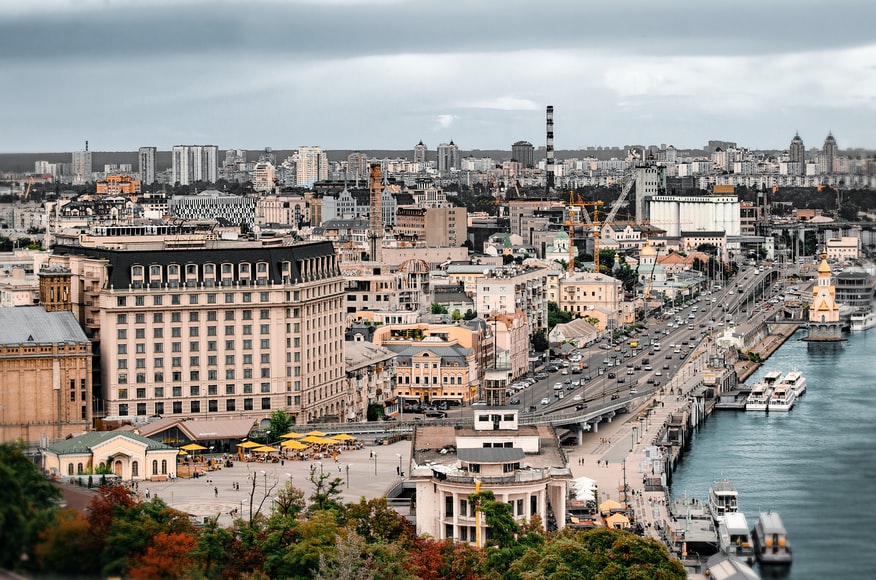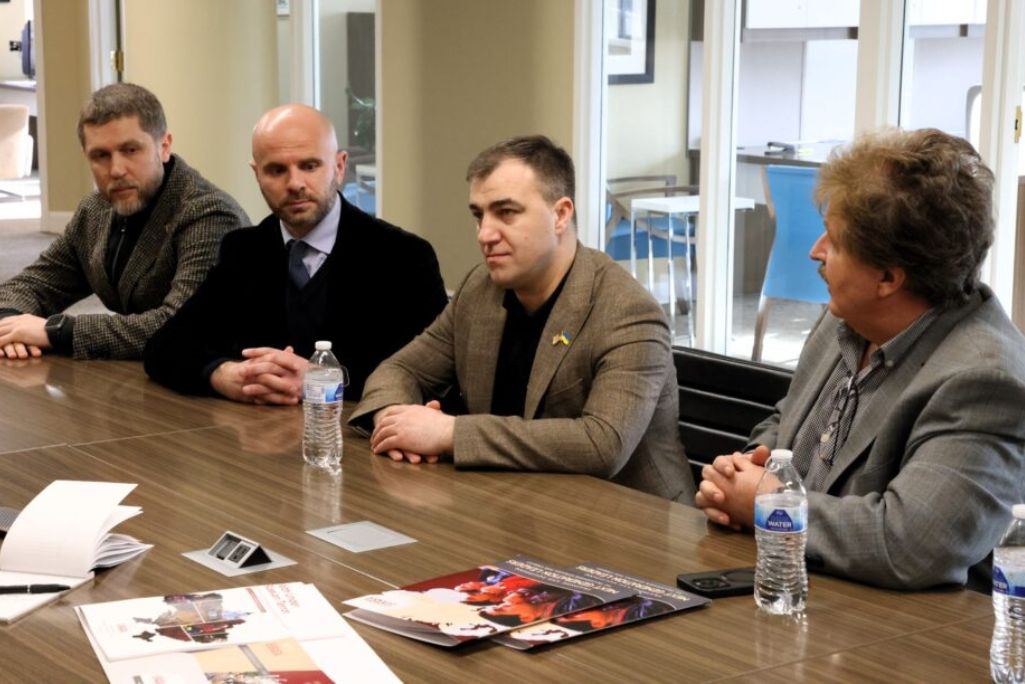
Kyiv, Ukraine
Over the last few months, tensions have mounted on the border between Russia and Ukraine. This has led to international coverage of this conflict because of the countries involved, the potential toll of an invasion and the role of NATO (North Atlantic Treaty Organization) in global affairs. The situation is dire and extremely volatile at the moment, where it seems at any point Russia may decide to invade the nation of Ukraine, leading to a full-scale military and humanitarian crisis. Details of this situation change rapidly with each passing moment, but below is what we know so far about this international conflict and why Christians should be paying attention to the situation.
What is happening?
Russia is currently assembling an unusual amount of forces on the border of Ukraine and in neighboring Belarus, which is led by the authoritarian dictator Alexander Lukashenko, a known ally of Russian president, Vladimir Putin, and close associate of the Kremlin. Some estimates indicate that the military force is at least a “hundred thousand troops, and a sizable arsenal of armor and missile systems,” including field hospitals and fuel dumps along the border of Ukraine. In Belarus, two “battalion tactical groups” have been deployed, indicating that Russia may try to divide Ukrainian forces in an all-out assault, including a possible attack on the Ukrainian capital of Kyiv. Currently, Russia has troops surrounding three sides of Ukraine since Russia annexed Crimea in 2014.
On Jan. 19, United States President Joe Biden stated that he expects Russia to “move in” on Ukraine soon. Just a few days prior, Russian hackers broke into Ukrainian government websites, displaying “a poster of the Ukrainian flag and map crossed out, and warning Ukrainians to ‘be afraid and expect worse.’” Microsoft reported that these hackers also placed destructive malware in Ukrainian systems, which could cause catastrophic damage. Some have warned that the threat of cyberattacks in Ukraine may ripple out to the rest of the world as well, which led the U.S. Cybersecurity and Infrastructure Security Agency (CISA) to warn critical infrastructure operators to prepare for the likelihood of future cyberattacks.
What is behind the growing tensions between Russia and Ukraine?
While the exact reasoning is still unclear, Russian officials, including Putin, have made it clear that they believe the possible admission of Ukraine and the expansion of NATO into Eastern Europe is in direct violation of promises made by Western leaders in the 1990s as post-Cold War settlements were made. Of note, Putin has long desired to rebuild the former Soviet states and reemerge as a dominant global player since the dissolution of the Soviet Union in the early 1990s under President Mikhail Gorbachev.
Russia claims that this expansion of NATO into Eastern Europe threatens its national security and that Russia is well within its rights to defend its own national interests. Some, including the former U.S. ambassador to Russia, believe that these are not the true reasons for the buildup and that Ukrainian democracy is seen as the real threat to Russian authoritarianism, not the prospect of any future NATO members. Regardless of the motivations, Russia seems to want military infrastructure removed from Eastern Europe and for the U.S. to promise not to allow Ukraine to join NATO.
What is NATO?
NATO is an intergovernmental military alliance consisting of 27 European countries, two North American countries, and one Eurasian country. Also known as the North Atlantic Alliance, NATO is tasked with implementing the 1949 North Atlantic Treaty – popularly known as the Washington Treaty – and is headquartered in Brussels, Belgium.
Originally, NATO was made up of 12 member states but over the years has expanded to include 30 countries. NATO officially recognizes three countries who have declared their aspirations to NATO membership: Bosnia and Herzegovina (a country in the Balkans), Georgia and Ukraine. The Republic of North Macedonia was the latest country to join the Alliance in March 2020. NATO has an “open door policy” which is based on Article 10 of the Washington Treaty. The treaty states that membership is open to any “European State in a position to further the principles of this Treaty and to contribute to the security of the North Atlantic area.” NATO’s stated purpose is “to guarantee the freedom and security of its members through political and military means.”
How are countries around the world responding?
The United States has sought to deescalate the tensions with Russia, warning of dire consequences for an assault on Ukraine. The U.S. has stated that aggression toward or the invasion of Ukraine will not be tolerated, but the U.S. has not committed to deploy additional troops to the border of Ukraine. President Biden had stated that the U.S. has already deployed more than $600 million worth of “sophisticated, defensive equipment” to the Ukrainians, and he has stated bluntly to Putin that he must choose “either deescalation or diplomacy; confrontation or the consequences.” On Jan. 23, the U.S. ordered the evacuation of diplomatic families from our embassy in Kyiv, and on Jan. 24, the Pentagon stated that it had placed 8,500 troops on “heightened alert” amid the tensions.
The U.S. and other countries have also considered sanctions and other means to dissuade Russia from an invasion. Officials in the U.S. are considering the use of novel export controls, which could “damage strategic Russian industries, from artificial intelligence and quantum computing to civilian aerospace.” If these export controls are broadly applied, Russian citizens may be deprived of “some smartphones, tablets and video game consoles,” according to a Washington Post report. These rules may also apply to other countries, as well, that do business with Russia, essentially crippling parts of the Russian economy. The Biden administration is also considering imposing personal sanctions on Putin if Russian troops invade Ukraine.
Other countries have also committed supplies, weapons and troops according to NATO leadership. Denmark will send a frigate to the Baltic Sea and will continue to deploy jet fighters to Lithuania as part of NATO’s Baltic air policing mission. France also expressed its support to send troops to Romania under NATO command. Spain is sending ships to join NATO naval forces and the Netherlands is sending aircraft fighters to Bulgaria for air policing as well as putting other units on standby for the NATO Response Force. It has also been reported that for the first time in decades, the U.S. has placed a carrier strike group under NATO command.
Why should Christians pay attention to this situation?
The tensions in Eastern Europe should concern us all given the worldwide effects of a Russian invasion of Ukraine. Not only does the prospect of a ground war raise concerns about major unrest in the region, untold loss of life and the possible inclusion of other major powers in the conflict, but this situation also indicates what Russia may seek to do in the coming years. As an international affairs expert and ERLC Research Fellow Paul Miller recently wrote, the battle over Ukraine is important for many reasons, including being “a testing ground for Russia’s post-Cold War intentions.” He goes on to state:
Russia has been steadily undoing the post-Cold War world. Putin famously said the collapse of the Soviet Union was a geopolitical disaster. Russia cyberattacked Estonia in 2007, invaded Georgia in 2008 and invaded and annexed Crimea in 2014. Putin withdrew from the Treaty on Conventional Armed Forces in Europe – another post-Cold War cornerstone – in 2015. Now he has amassed an army on Ukraine’s border that has every appearance of preparing to invade. Putin plainly wants to undo the post-Cold War settlement, restore Russian arms and glory and force the world to recognize Russia’s place as a global superpower on the international stage.
Along with Paul Miller’s warning of a possible reunification of the former Soviet Union and the reassertion of Russian dominance on the global stage, David French notes that territorial aggression like this rarely stays confined to a particular area, which would inevitably destabilize the world order.
Many scholars, including Miller and French, have rightfully expressed grave concerns with the U.S. entering into armed conflict with boots on the ground. While Christians should be among the most vocal opponents of armed conflict in this situation, especially any type of full-scale war, there are much deeper reasons to pay attention to these developments than simply self-protection or global interests.
Given what we know about how Russia and other authoritarian regimes around the world – such as the Chinese Communist Party and its inhumane and genocidal treatment of Uyghur Muslims – override basic human rights and freedoms in the name of national security, it should concern all Christians when a nation like Russia seeks to expand its territory through illegal and deadly authoritarian land grabs. While many Christians in the West rightfully cherish the blessings of governments that recognize and uphold basic God-given rights, many believers around the world live under these types of repressive regimes that routinely put profit over freedom and power over human rights. People created in the very image of God are frequently put in harm’s way and seen as nothing more than a pawn in the relentless pursuit of power and global influence.
As many weigh the variables of this conflict through the Christian moral theory of just war and evaluate the merits of entering into conflict, Christians should pray for de-escalation efforts and for the avoidance of a Russian-led invasion of Ukraine. It is far too easy to see those in harm’s way as simply a news headline or a mere statistic – especially in our increasingly digital society. But Christians understand that all people are created in the image of God, even our enemies. This truth is central to the Christian ethic, including how we navigate tensions of this scale and their importance on the global stage.


